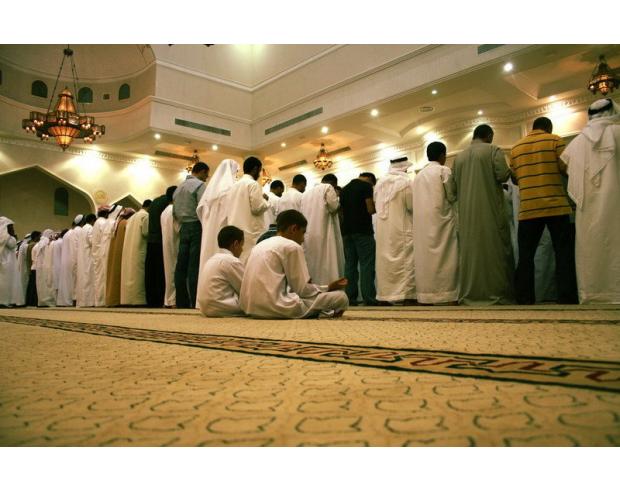I RETURNED to my dormitory room after a full day of classes—and fasting. I was exhausted. Outside was dark, and my stomach grumbled. I had eaten only a little at iftaar because I had been so busy with schoolwork and meetings. As I settled at my desk with a bagel and some grapes, I glanced at the clock. It was almost time for Ishaa. Already, I felt dread knotting in my chest. I could barely keep up with praying my five prayers on time; how would I pray Tarawih…alone? I drew in a deep breath and exhaled, in that moment mentally scolding myself for my doubts. I will pray Tarawih every night this Ramadan, I told myself, no matter what. An hour later I was facing the Qiblah as I completed my first two units of Tarawih. Heaviness weighed on my limbs and my mind wandered. How many more to go? I asked myself in irritation. I mentally blocked out the question and moved on to the next set of prayers…and the next…and the next. When I finished I almost collapsed in relief. I was finally done. I met the warmth of my bed feeling as if a weight had been lifted from my shoulders… ….And an even weightier load put in its place. That was the last time I prayed Tarawih that Ramadan. “Whoever observed prayer at night during Ramadan because of faith and seeking his reward from Allah, his previous sins will be forgiven.”[1] It took a series of repeated spiritual failures like the one I experienced as a first-year American college student before I finally faced the painful reality I had been avoiding for so long: Ramadan just wasn’t what it used to be. My parents had become Muslim the year I was born, so all the years preceding my living alone for the first time were filled with Islam in the house. As a child I fasted the long summer days along with my older siblings and my parents. I enjoyed the burst of pride I felt upon waking early in the morning and breaking fast at the end of the day. I felt like such a “grownup” savoring the sweetness of dates and cold water, and praying shoulder-to-shoulder next to my big sisters. I also felt a sense of purpose sitting down and reading a thirtieth of the English Qur’an and reflecting on its verses. And I was unable to contain my sense of accomplishment upon finishing the entire book at the end of the month. Although as a child fasting was not always easy (especially during the summer when the sun set close to nine o’clock at night), I recall Ramadan being such a tranquil month, and I was often in awe at the spirituality I felt emanating from within. As I worshipped Allah, at moments I really felt a sense of camaraderie with the rest of the world—the sun rising each morning, the stillness of the grass outside, and the smiling faces of believers… To me, Ramadan had always been… Magical. …Until it wasn’t anymore. One day the Messenger of Allah, sallallaahu’alayhi wa sallam, ascended the mimbar and said: “Ameen. Ameen. Ameen.” The Companions asked, “O Messenger of Allah, why did you do that?"” He said, “[The Angel] Jibreel said to me, ‘May Allah rub his nose in the dust—the person to whom Ramadan comes and his sins are not forgiven,’ and I said, ‘Ameen’…”[2] When I first heard this hadith, I shuddered. Was it that my loss of tranquility in Ramadan was due to my being amongst those about whom the angel spoke in this hadith? …I didn’t want to think about it. It has been more than fifteen years since I spent my first Ramadan away from home. And although I’ve been blessed with many a tranquil Ramadan thereafter—filled with nights standing in Tarawih and crying to Allah—I don’t think I’ve ever recovered from the spiritual loss I suffered that year. Even now as Ramadan has arrived and I have a family of my own, I feel my chest constrict and tears of apprehension fill my eyes... “When the month of Ramadan starts, the gates of Paradise are opened and the gates of Hell are closed, and the devils are chained.”[3] Will I suffer like I did before? Will I turn from the gates of Paradise, shutting my eyes to my faults and sins? Will I stand eagerly—and patiently—at the gates of Hell… Awaiting the Blessed Month to end? …I shiver at that thought. “O Allah! Protect me from myself!” I pray. “Ramadan is the most feared and eagerly awaited month of the year,” I wrote in my diary a few years ago. And for me, it is. …Because now I know all too well that there is nothing “magical” about the Month of Mercy. There is no tranquility that will fall into your lap. There is no spirituality that will settle over you while you sit idle… Only those who want Ramadan’s blessings will receive them. Only those who want Allah’s forgiveness will be granted it. And only those who want Paradise will enter it. And for me, that is the most terrifying—and welcomed—reality of all… …That it is possible for any human—whose death is the only imminent certainty of life—to actually live a single day on this earth, or an entire month of Ramadan, without benefiting from it. …And that it is possible for any human—who sincerely turns to Allah before that moment of certainty—to be granted forgiveness greater than his faith and deeds deserve. And Allah offers us both in this Blessed Month. Which will you choose?
2014-04-18 03:44:22
I RETURNED
sign in to comment
Be the first to comment





